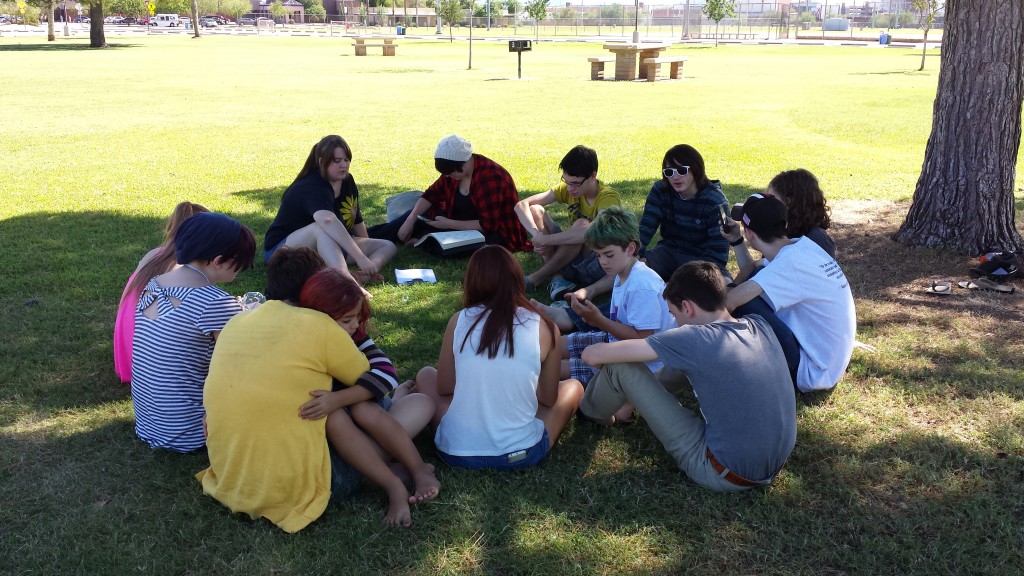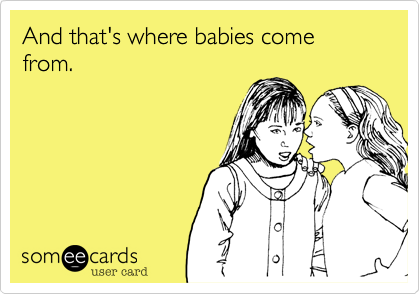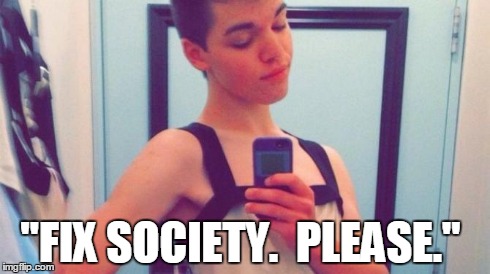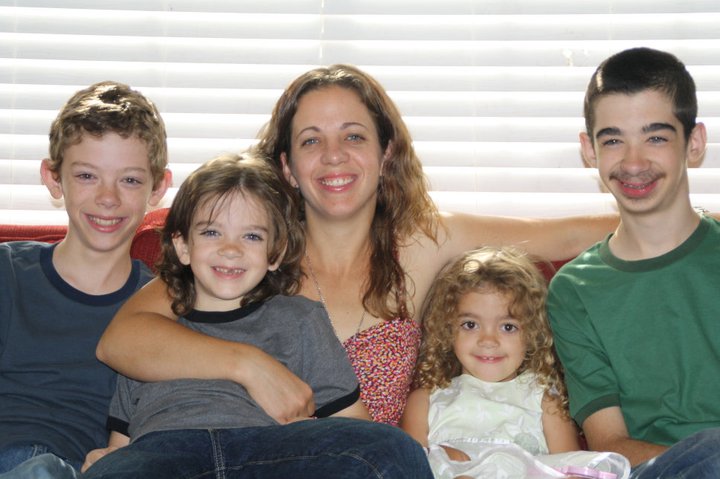
I love teenagers.
I’m lucky enough to have two (so far) of my own, but I love getting to borrow other people’s teens as well.
Teens are awesome. They’re smart and funny and interesting, and some of the most multi-faceted people I know. One minute they have more maturity than an adult …. and the next they’re simply really tall children, embracing all the sense of play and wonder that too many people lose as they get older. One of my favorite memories of the conference was when I peeked into the teen room at one point to see that all the tables had been tipped on their sides, pushed together, and covered with table cloths to make a really huge fort… much like a toddler would do with sheets in the living room. 🙂 Even now, nearly two months later, it still makes me smile.
They’re wonderful.
Which is why, when I read articles like the one I just read that advised controlling your teen through shame and humiliation, one of the many things I feel is genuine fear that people are missing out on what could potentially be one their favorite stages of life with their children.
And yes, there are challenges, as there are at any age, in any relationship. Parenting a teenager is a whole different ball game than parenting a younger child, to be sure. But the answer to the struggles is not more control, but more understanding.
Here then are 10 things that help my relationship with my teens stay as close and connected as it was when they were little:
1. Respect their need to hibernate – When Spencer (now 17) was going through puberty, he started sleeping…. a LOT. It honestly felt like he was sleeping 20 hours a day, although I’m sure it wasn’t really that much. When he wasn’t sleeping, he was lounging with a remote or a PS3 control, and my formally talkative, animated kid mostly grunted to me in response. I was starting to get genuinely concerned until I started asking my friends with older kids and they all assured me that it is very very normal, and that my job was to basically just keep on loving him and not try to change him. The fresh perspective helped when Paxton started going through it a couple years later. “Yes! I remember this! And it’s okay.” Teens hibernate sometimes. They’re going through major changes and they may withdraw/sleep/grump for weeks or months or years. It’s okay. Respect it.
2. Respect their right to privacy – I can think of no way quicker way to break trust (with anyone, but particularly with a teenager) than by snooping through their things, demanding personal information, or not respecting their space. YES, be involved in their lives. YES, have open lines of communication. YES, work with them to help keep them safe. But rifling through rooms and phones and Facebook accounts only destroys trust, creates feelings of violation, and widens the gulf between you.
3. Respect their individuality – I have two very different teenagers. One’s a sharer. One holds his cards very close to his chest. One’s an extrovert. One needs to spend massive amounts of time in his room to recover after any sort of event. One has a wickedly dry sense of humor. One laughs when someone says “balls.” I love them both equally, and I love spending time with them both equally, but my time spent with each is different, and it wouldn’t be fair to expect anything else. Allowing someone to be themselves is one of the greatest gifts you can give them, especially during teenhood, a time when their sense of self can be so tenuous.
4. Remember what it was like to be a teenager – I was 15 the first time I truly got my heart broken by a boy. Whenever I think of being a teen, that immediately springs to mind. But whether it was boys or teachers or peer pressure or betrayals of false friends or just feeling like NOBODY UNDERSTANDS, being a teen was HARD. Life felt like an emergency. All. The. Time. My body was changing; Hormones were raging; I was trying to figure out who I was, where I fit, what the world meant. I was stressed out and confused and uncomfortable in my own skin. Now, admittedly I don’t see nearly as much of that in my own teens (some of which can probably be attributed to genetics, and some to unschooling). Their transition to teenhood has been a much smoother ride, and they’re generally drama-free. But. There are moments, for sure, that are difficult, and the very best that I can do to help is truly remember how it felt so I can listen sincerely, empathize honestly, and when there is nothing else to say, offer a genuine, “Yeah, life really sucks sometimes. But it does get better.”
5. Encourage their independence – Earlier this fall, Paxton flew to Michigan (at 14) to stay with friends for a couple of weeks. This was a first for both of us, and I missed him terribly – I’ve faced up to the fact that I just feel the best when all of my chicks are “in the nest” – but it was an amazing and important trip for him, and one that gave him the confidence to do more traveling on his own. So while my instinct nearly told me to throw my arms around his ankles and beg him not to go (in a slightly less dramatic fashion, of course), I knew that it was a positive thing for both of us. Letting go is just as much a part of parenting as holding on, from the small ways to the large, and being a parent to a teenager means letting go again and again. Independence is an important part of a child’s growing autonomy, especially as a teen, and it’s our job to honor it. BUT,
6. Don’t PUSH their independence – There’s no magic age at which a person needs to: get a job, get a driver’s license, or for that matter, fly solo across the country to visit a friend.Everyone’s path is different; everyone’s time-table is different. Life is not a race to the finish line. One person’s journey is not better than another’s, and it’s remarkably unfair as a parent to compare. Sometimes a teen needs wings to fly. Sometimes he needs someone to sit by his side and say, “I’ll be here as long as you need me.” It doesn’t matter what your niece or your friend’s son or the go-getter across the street is doing. What your child needs from you is for you to support THEM, exactly as they are. Encouraging, cheering, supporting…. but never PUSHING before they’re ready.
7. Check in with them often – Remember the hibernating from point #1? It can be SO easy to just let them do their thing and only say hello if you happen to cross paths when they finally got hungry enough to come out to the kitchen to make a sandwich. And, for sure, there is a certain degree of giving them their space that’s not just okay but necessary. But relationships can’t exist in a vaccuum. They need consistent care in order to thrive. Have dinner together.Find out what’s new. Bring her a fun snack when she’s at her computer. Ask him about the book he’s reading. Surprise them with the movie they’ve been wanting to see. You can’t maintain a healthy relationship without connections, and you can’t have connections without taking the time to make them.
8. Be interested and interesting – One of the truly fun things about having teens is that they’re able to discuss and have opinions about more “grown up” things like current events, shared TV shows, or politics. I love getting my boys’ perspective on all of the above, and I share my own thoughts freely. Similarly, I show an interest in their interests (which, admittedly doesn’t always come naturally. I’m not a video game player for instance, and all of my kids are. I’m learning) If it’s important to them, I respect it. I listen to their stories. I share articles/websites/videos that I think they’ll be interested in. I share of myself too! I’ll tell them the funny thing that happened when I was at yoga. I’ll talk about the blog post I’m writing. In short, I involve them in my life, and – when I’m invited – I involve myself in theirs.
9. Don’t take everything personally – So, I’m sensitive, and I have a tendency to get my feelings hurt easily, especially when it comes to the kids. Experience has taught me that this is NOT a helpful trait, particularly in the arena of parenting teens. As I said above, being a teen can be hard, and that hardness sometimes spills, leaks, or spews out as something resembling sarcasm or sullenness or anger or selfishness. In other words, they’re human, just like the rest of us, doing their best to deal with life and circumstances and big, big changes. I remember once when one of my boys and I went through a phase when we were seemingly butting heads daily, and I inevitably went to bed with my feelings hurt just about every time. It was just a season – in hindsight, it didn’t last long, but in the moment it felt like it went on forever. At the height of it, I cried – bawled – one day in the car, hurt because we’d had plans together and he backed out at the last minute. I allowed myself that sadness, but then I took a step back and reminded myself: “It’s not about me.” I’d gotten hurt with collateral damage, yes, but it was really, truly not about me. It was just something he was going through, a messy period of growth, and my internalizing it and getting all visibly upset about it not only didn’t help, but also just prolonged the problem. Once I recognized that, and emotionally extricated myself from the situation, it gave him the space to work through whatever it was he was working through, he realized I was on his side, and our relationship rapidly improved.
10. Don’t be afraid to be their friend – No, not someone who just tells them what they want to hear, and not someone who’s only around for the fun stuff, but an actual friend. Listen without judgement, accept them for who they are, be someone they can trust at all times. Be the one they can ask about last week’s Breaking Bad, AND about last weeks election. Be the one they feel they can come to with their celebrations AND their heartache.
_____________________________________________________________________________________
Above all, be their constant. Their unshakable, unmovable rock in a world and life that’s so rife with change and uncertainty. It’ll be hard sometimes, but it’ll also be oh so very very worth it. Because despite what the overly negative, mainstream, “Just wait till your kids are teens” admonitions may try to tell you, teens are amazing. And the person who gets to parent one (or 2 or 3 or 4) is a lucky, lucky parent indeed.

















